Caring for a sphynx cat or sphinx
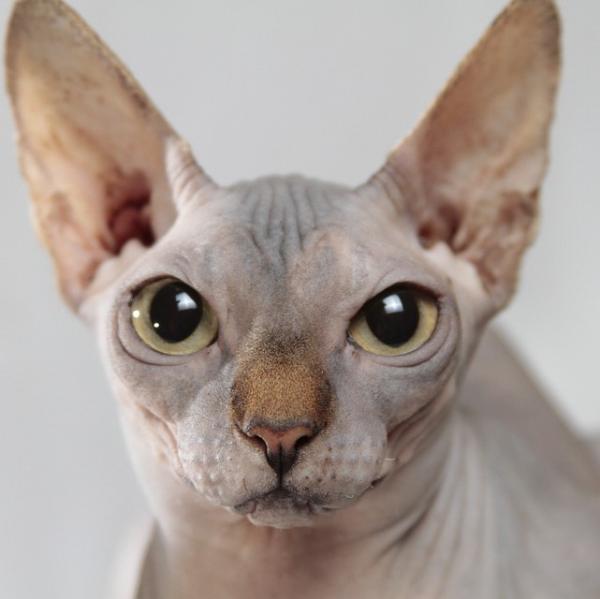
If you are thinking of adopting a sphinx or sphynx cat, better known as a hairless cat, you should take into account some details about its care, such as feeding or dermis to avoid possible health problems. This breed comes from Canada and baldness is caused by a recessive gene.
The Sphinx cat is a very particular breed and therefore also requires particular and specific care that will provide an optimum state of health.
Continue reading to learn more about all the care of a sphynx cat or sphinx, the maintenance it requires and other curiosities related to the breed of this peculiar cat. Discover them!
Feeding the sphinx cat
The sphynx cat it needs a different diet to that of the vast majority of feline breeds. Lacking a thick coat of hair (they are covered by a very short hair, almost undetectable to the eye and touch), sphinx cats have a thermoregulatory system more complex than the other races. Your body temperature is higher than that of furry cats to make up for the lack of hair.
This faster metabolism difference causes the sphinx cat to consume more food than any other cat of its same size. For this reason it is imperative to feed the sphinx cat in a special way.
To begin with the care of a sphynx or sphinx cat, we will search the market for specific balanced foods for sphinx cats. These foods are prepared for all the demanding nutritional needs of the sphynx cat, which it needs more proteins and fats in your diet that cat breeds with hair.
Although a cat food puts its protein on the 30% and the fat around the 20%, the sphinx cat needs a feed that, at least, contains an 35% protein and an 25% fat.
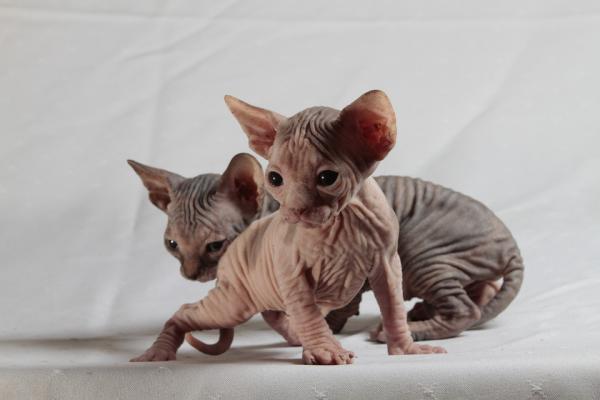
Bathing and hygiene of the sphinx cat
Sphinx cats sweat and accumulate protective grease, oily texture, on your skin. This circumstance causes them to get dirty more often than cats with hair. In addition, they can not properly groom themselves, so they depend on their caregiver for proper hygiene.
Although it is generally recommended a monthly bath, not all sphinx cats get dirty as quickly. For that reason, you should be aware of the texture of your skin, the accumulation of dirt and even a reddish tone in your dermis. Remember that the small folds in your skin can tend to accumulate dirt and microorganisms, causing the appearance of scabies, among other diseases.
For the bathroom, we will use specific products for sphinx cats, since the excess of bath or the use of inadequate products can cause a greasy skin in the cat and even serious irritations in its delicate dermis. If we do not find specific products for sphynx cats, we can look for shampoo for cats with sensitive skin as well as cat wipes. If you do not neatly groom the sphinx cat, also known as the Egyptian cat, the appearance and feel of your skin is greatly diminished. Which causes the poor animal to be uncomfortable and sad.
Eye care of the sphinx cat
The sphynx they lack eyelashes, for which the care of their eyes are more rigorous than usual in other races. They are more subject to infections, therefore constant hygiene is paramount. It must be soaked sterile gauze with physiological saline (it is acquired in pharmacies and some supermarkets). With this wet gauze the cat’s eye will be carefully washed. A different gauze should be used for each eye.
Cat earphone hygiene sphynx
As with the eyes, we must also maintain a thorough hygiene of the sphinx cat’s ears, which have a certain tendency to accumulate mites, grease and wax if they are not cleaned with the appropriate frequency. Also use sterile gauze to clean your cat’s ears. You will only need to surround your finger with the gauze and move it carefully inside the auditory pavilion to eliminate this accumulation.
Finally, highlight the importance of cutting and eliminating the accumulated dirt of the ones. The habitual use of the scraper will help us to have to cut them less frequently, besides being an enriching and positive activity for the cat.
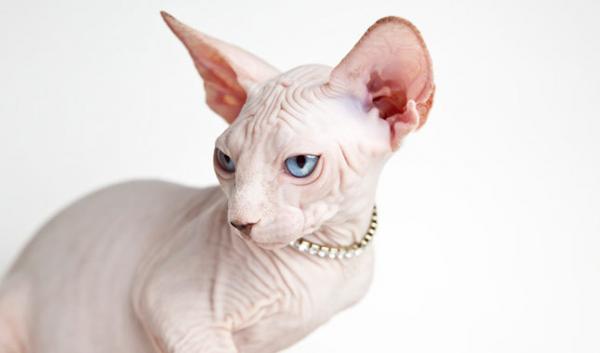
Household temperature and others
The sphinx cat is a cat that must live exclusively indoors, since exposure to outside elements can make you very sick.
Household temperature
First of all we must recommend that, throughout the year, the temperature of our home is around 22 – 25 ºC. A lower temperature can cause colds, flu and discomfort in our delicate feline.
Extra care in winter
Despite our attempts to conserve the heat of the home, temperatures may drop excessively and we need to protect it properly. For this we can use clothes for cats and offer a bed or nest fluffy and blankets. So you can take refuge when you need it. We can also heat your wet food cans or homemade recipes that we prepare occasionally.
Extra care in summer
Exposure to the sun’s rays They can cause sunstroke and even severe burns. For that reason it is highly recommended to monitor your exposure to the sun in the hottest summer seasons and pay special attention to your dermis and behavior to detect any problems promptly.
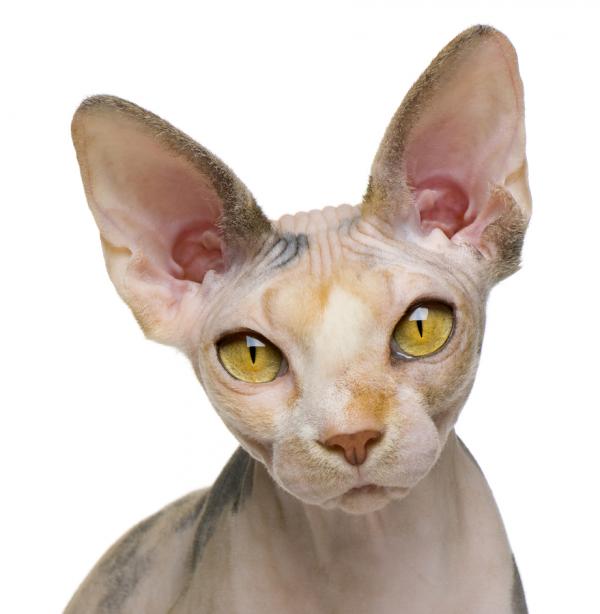
Diseases and health problems of the sphynx cat
It is important to go to veterinary each 6 or 12 months to promptly detect any disease and verify that your health status is appropriate. In addition, the veterinarian will help us to follow correctly the vaccination schedule and the deworming of our sphynx cat. Some of the most common diseases or health problems can be:
- Bad smell: It is usually caused by deficiencies in the hygiene of the sphinx cat. Remember that you should wash every 1 or 2 months at the most for their excessive production of fat and sweat, as well as clean their eyes, ears and genitals.
- Scabies: It is one of the most common skin problems and is directly related to hygienic deficiencies in the cat. It can also occur by contagion when in contact with other infected animals and humans.
- Allergies: As with all types of cats, the sphynx cat may suffer from food or environmental allergies. We usually detect them by eruptions in the dermis.
- Feline immunodeficiency: Also known as feline AIDS, this disease is very contagious among individuals of the same species and its consequences are serious, since the animal loses immune defenses and is susceptible to becoming ill on a regular basis. It is transmitted by infected cat bites and through sexual intercourse.
- Feline coronavirus: It is a virus that mutates easily and can cause very different symptoms in our feline, including weakness, vomiting or diarrhea. There is no specific treatment, the symptoms of the coronavirus must be alleviated.
- Feline infectious peritonitis: It is usually caused by the feline coronavirus, mentioned above, and it is an inflammation of the blood vessels.
- Hypertrophic cardiomyopathy: It is a very common disease in cats and its origin is genetic. It usually appears in breeding lines in which members of the same family are used to reproduce, something very negative in the health of the puppies, who come to develop more easily this type of diseases.
Following our advice, paying attention to possible diseases and going to the veterinarian whenever necessary, our sphynx cat can place its longevity between 14 and 20 years.
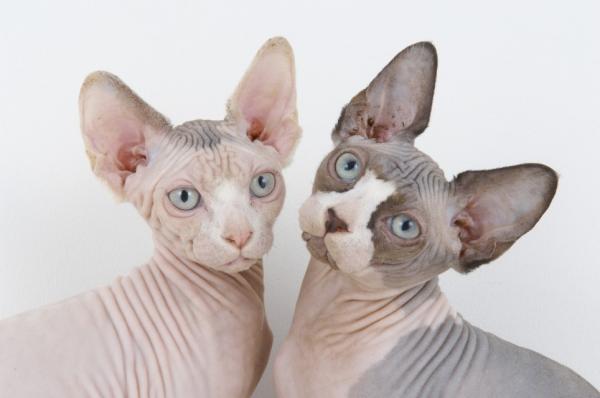
If you want to read more articles similar to Caring for a sphynx cat or sphinx, we recommend that you enter in our Basic Care section.


